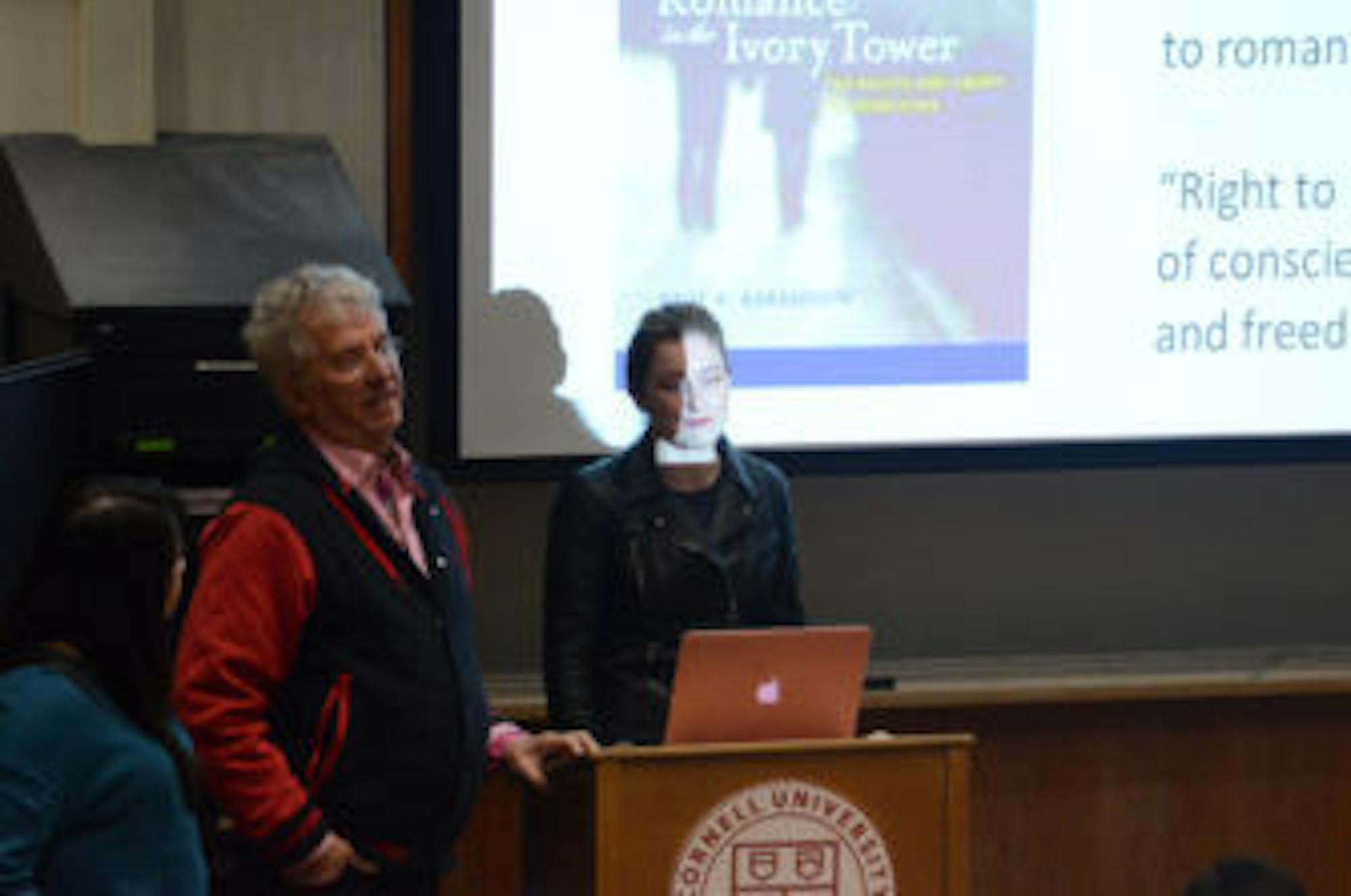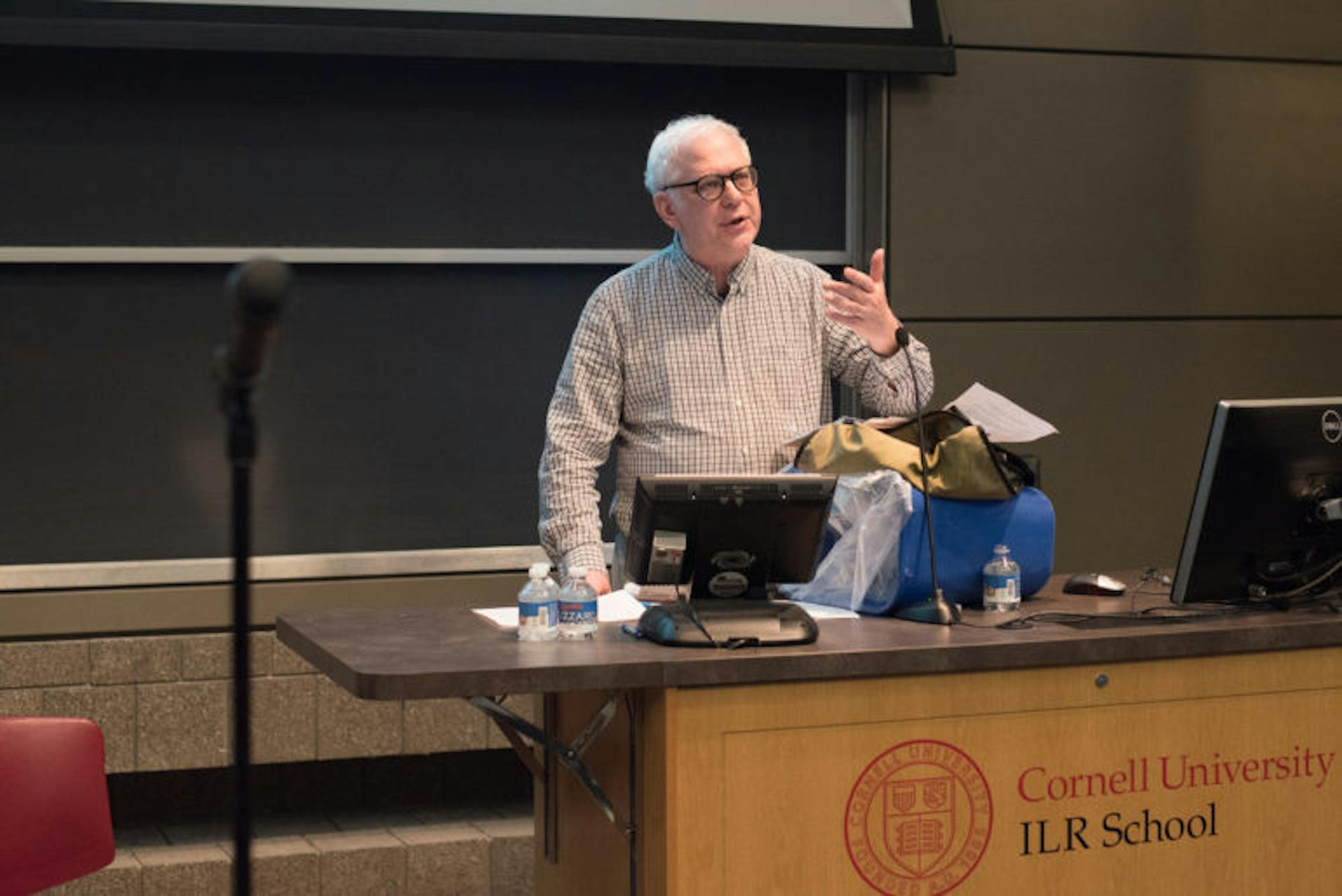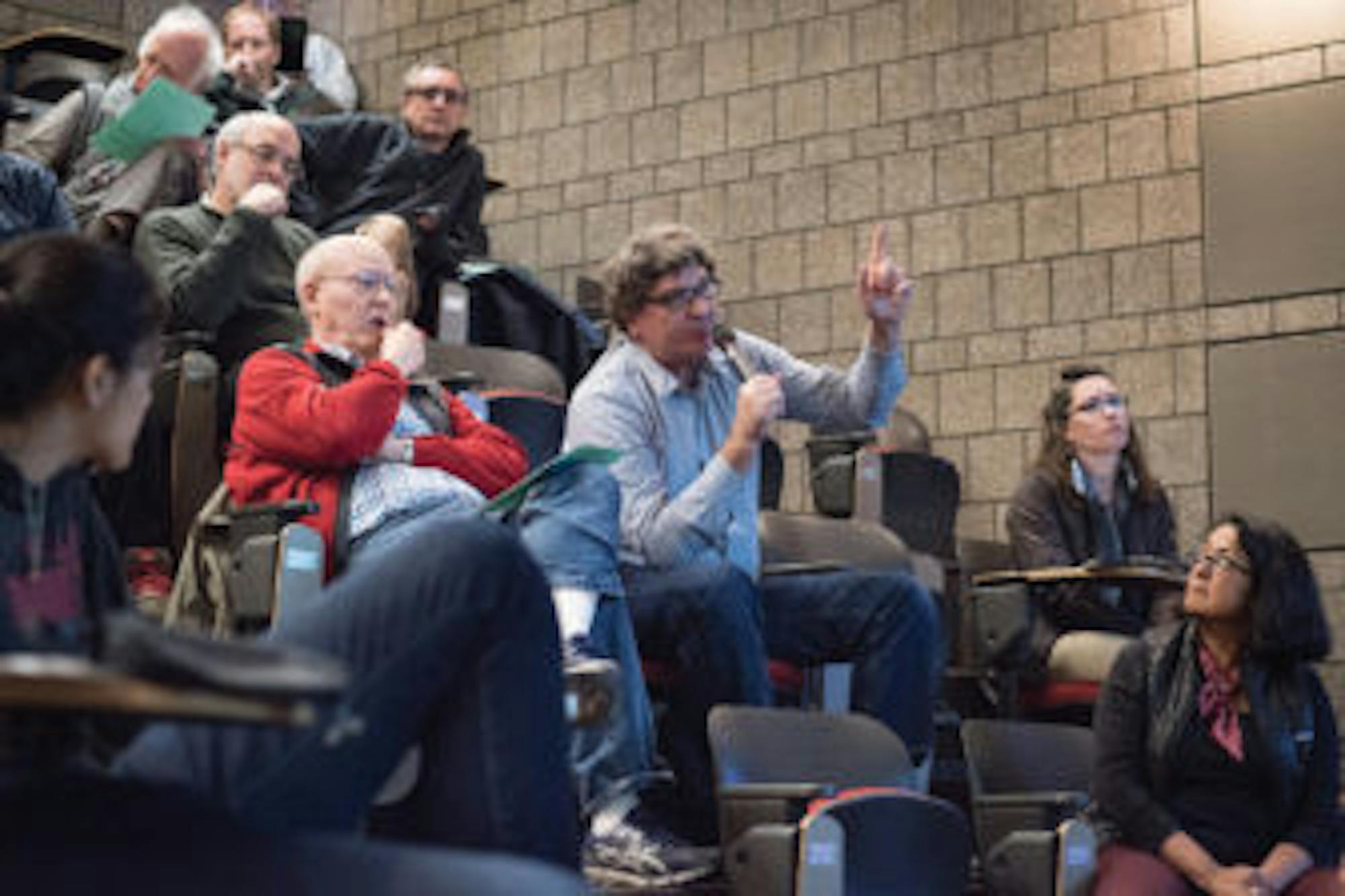After a year of deliberations and debates to update a 20-year-old policy, the Consensual Relationships Policy Committee will submit its final report to President Martha E. Pollack on Tuesday.
The current policy, last updated in 1996, bans any member of the University from “simultaneously [being] romantically or sexually involved with a student whom he or she teaches, advises, coaches or supervises in any way,” and asks that relationships be conducted in such a way that avoids “potential conflicts of interest, exploitation, or personal bias.”
In her charge to the committee at the beginning of the fall 2017 semester, Pollack criticized the current policy for “its lack of distinction between different groups of students [undergraduate and graduate],” its vagueness regarding prohibition and disclosure requirements and “its lack of clarity regarding enforcement mechanisms.”
Now, after a year of work, co-chairs Prof. Charles Van Loan, engineering, dean of faculty, and Anna Waymack grad believe they have fulfilled Pollack’s task.

The committee, composed of undergraduates, graduates, faculty members, researchers, employees and staff, ended its deliberations with two policy options: CRP-A and CRP-B.
The two policies are essentially identical. Both include a complete ban on sexual or romantic relationships between faculty and undergraduate students and neither allow any member of the Cornell community to exercise academic or professional authority over a student with whom he or she is sexually or romantically involved.
Just last week, Columbia University’s Senate banned all relationships between undergraduates and faculty, The Columbia Spectator reported.
The undergraduate ban at Cornell has received popular support, with the Student Assembly voting with a four to one ratio in favor of the ban, according to Van Loan.
“It’s not that undergraduates are naive or unable to fend for themselves,” Van Loan said. “The difference between undergraduates and graduates is that graduates have completed an academic degree. They have also gone through the process of applying to get here and that means they know a little bit about the power of faculty.”
“Undergraduates haven’t fully seen that,” he added.
Waymack clarified that undergraduate teaching assistants weren’t considered faculty; however, she did state that the proposed policy prevents T.A.s from exhibiting academic authority over those they are sexually or romantically involved with.
It is the difference between the two policies that has drawn the sharpest criticism and strongest debate — CRP-A bans all faculty and graduate/professional student relationships if both partners are “affiliated with the same graduate field or degree program.” CRP-B allows such relationships under the condition that the relationship is disclosed and a proper recusal plan is drafted.
Many faculty members, such as Prof. Richard Miller, philosophy, have criticized CRP-A as “excessive.” Others, however, including both Van Loan and Waymack, support the policy for its clarity.
“Having a bright line sends an unambiguous signal that there is a zone where the academic interests for the group have unequivocal priority over the romantic interests of the individual,” Van Loan said on his ballot.
The University of Pennsylvania, on March 27, updated its policy with language similar to that of CRP-A, banning all “sexual relations or dating relationships between a faculty member and a graduate or professional student during the period of the faculty/student relationship.”
On the other hand, severe criticism has been directed towards CRP-B for its emphasis on disclosure and recusal, with many faculty members and students worrying about privacy and the proposed 6.x office, which would handle all such disclosures and recusals.
In fact, Miller presented an amendment to the Faculty Senate on April 18, which proposed a revision to CRP-B that would allow “either the 6.x office or the individual who is responsible for the academic workplace that is shared by the faculty member and the subordinate” to handle the disclosure process.

However, both Van Loan and Waymack were adamant that an outside entity was necessary in order to prevent these cases from being “swept under the rug,” although they clarified that the 6.x office would work with departments in order to create the optimal recusal plan.
“Students would, on the whole it seems, very much prefer that faculty not be the first point of contact, and perhaps not even be contacted,” Waymack said.
Others have expressed concerns regarding privacy, like undergraduate committee member and incoming Student Assembly executive vice president Joseph Anderson ’20, who wanted to join the committee to make sure that considerations for LGBTQ individuals, like being closeted, were discussed during the policy’s crafting. He felt the original draft was “based on a lot of heteronormative language.”
Prof. Ken Birman, computer science, also foresees problems with asking all individuals to disclose their relationship status, especially in the case that an LGBTQ couple fears backlash.
“There is absolutely no statement about privacy in the CRP-A or CRP-B proposals: 6.x is under no obligation not to announce every single thing they learn. Indeed, CRP-A and CRP-B more or less require that the 6.x office inform a half dozen people of anything that comes to the office,” Birman said.
He added that if an LGBTQ couple were to attempt to keep their relationship a secret, a privacy both the U.S. government and New York State recognizes, their academic career could be ruined.
“Perhaps they fear that a very conservative person in their unit might somehow discriminate against them if their orientation became known,” Birman said.
Van Loan and Waymack said that the disclosure procedure would be designed to keep the “radius of disclosure” as small as possible.
Other faculty members wonder if updating the policy is even necessary.
Prof. Richard Bensel, history, said that the previous policy “adequately covered” recusals in the case that an individual was in a relationship with someone whom they had authority over. He said the “University regulation of relationships between consenting adults is infantilizing, paternalistic, and intrusive” and has “no place in a community of reason, intellectual exchange, and open discussion.”

“I have no faith that those who administer the new ‘Office 6.x’ will be able to regulate personal relationships with anything like tact and sensitivity,” he added.
To Birman, the existing policy has a “tough policy covering coercive behavior, harassment, favorable but biased behavior and a whole host of other possible abuses of power or authority.”
However, Prof. Kent Hubbell ’69, architecture, who was dean of students from 2001 - 2016, was clear that the current policy wasn’t strong or clear enough to handle the issue.
“These kinds of things have been dealt with such discretion in the past, many faculty don’t think it’s a problem,” Hubbell said, adding that he’s seen the “very unfortunate circumstances that have led to very negative outcomes for students” in-person.
“Our policies, viewed as having to do with romantic relationships, also have to speak to the problems we face in regards to predatory behavior on campus,” he said.
After the committee submits its final proposal to Pollack, the crafting of the policy shifts to the University’s lawyers and human resources. The committee’s job was simply to give a read of the campus through the various assembly and senate votes and put in suggested guidelines.
Van Loan said that their draft was detailed in order to ensure the campus was educated. His hope is that when the lawyers offer the official policy, the Cornell community will have the ability to discuss it intelligently.
“I think we’ve accomplished step one, which is raising the profile of this issue across campus,” he said.
Waymack and Van Loan emphasized this policy wasn’t a “judgement of what happened 20 or 30 years ago,” but compared the viewpoint change to the evolution of how people’s view of seat belts has changed.
“A generation ago, how many people wore them? It wasn’t a thing, and then we realized the risks and now in fact it’s not only legally required, but frowned upon to not buckle up. Not that people back then were knowingly doing something wrong or taking risks, it’s just that we have a better awareness of this now,” Waymack said.
The University declined to comment, however a statement is expected to be released following the submission of the final report to Pollack.











